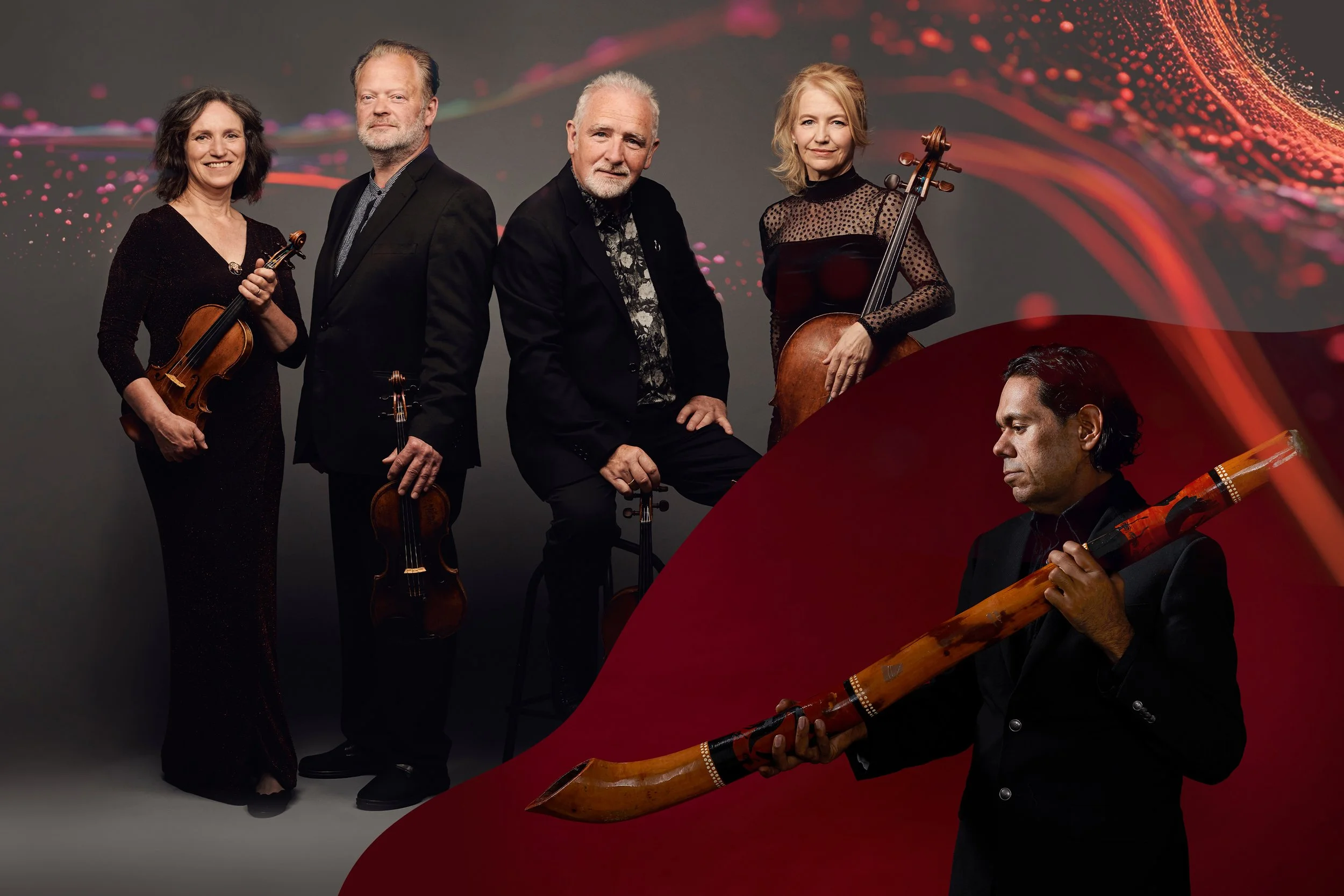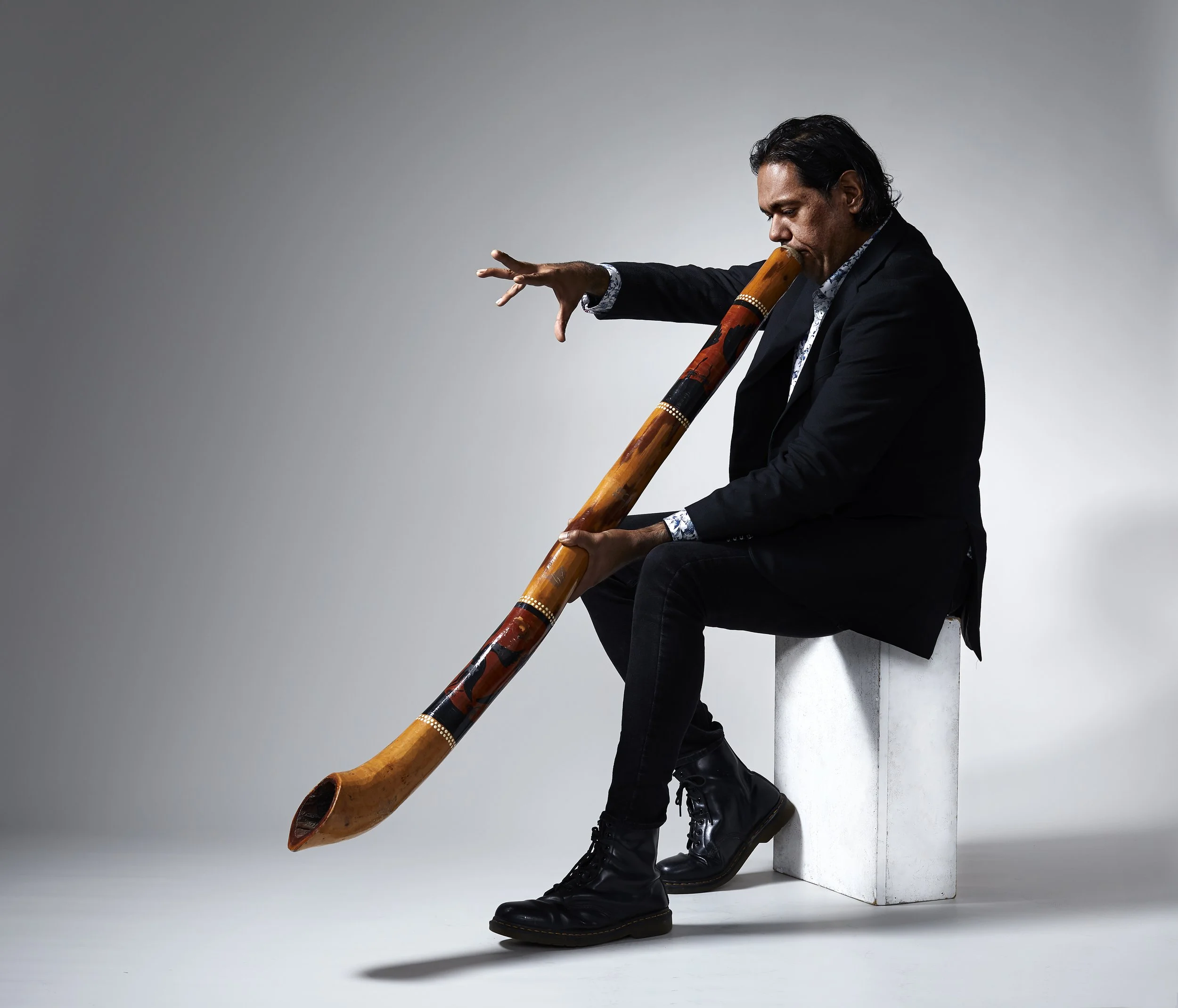Barton and Brodsky: story-telling magic in sound
The Brodsky Quartet and William Barton, didgeridoo
Photo supplied by Chamber Music New Zealand
When William Barton plays the didgeridoo, it becomes a living voice, singing the history of his land in the unique language of the instrument, the ancient history of Kalkadungu country. At the recent Chamber Music NZ concert ‘Barton and Brodsky’, when Barton joined the UK musicians of the Brodsky Quartet, the voice of the didgeridoo was heard first from off-stage, a signal of its presence, and perhaps what those of us from Aotearoa understand as a karanga, a call to open the occasion.
It opened a special and completely engaging concert. The Brodsky Quartet, like Barton, legends of their artform, began with a short Fantasia by Purcell, music from their English history, but framed by didgeridoo, with Barton joining them on stage at the end.
The five then moved the scene to Australia, with Peter Sculthorpe’s 11th String Quartet Jabiru Dreaming, a work inspired by the rock formations of Kakadu National Park and premiered in 1990 by the Kronos Quartet. The music has sense of travelling through a vast landscape, the didgeridoo a distinctive layer in a multifaceted rhythmic, repetitive texture, with bird-like interjections from cello glissandi and short utterances from Barton’s instrument.
Didgeridoo virtuoso William Barton
“…singing the ancient history of Kalkadungu country.”
The mood changed with Minjerribah by Brisbane composer Robert Davidson. The name refers to a large and beautiful sand island in Queensland, and it begins with a folk-like lyricism, the melody passed from violin to cello. The didgeridoo then brings a subversive quality with its deep buzzing sounds, making us hear the harmonies differently. It’s as if an ancient, unpredictable creature is commenting on the music, the juxtaposition introducing a little wildness to the piece. All five musicians approached Minjerribah playfully with an infectious sense of fun.
The whole concert was a feast of story-telling. The next narrative was for string quartet alone, Janáček’s 2nd String Quartet, Intimate Letters, written in the last year of his life and acknowledging his passionate friendship with a married woman 38 years his junior. The pair had exchanged over 700 letters and this quartet is another love message - Janáček famously wrote “these notes of mine kiss all of you.”
The Brodsky’s performance expressed all the work’s ardour, anguish and strangeness. Janáček personifies the viola as his beloved, with a beautiful yearning solo played by Paul Cassidy, but it is the 1st violin part that carries more of the work’s romantic lyricism and Krysia Osostowicz’s gorgeous singing tone and musicianship shone throughout the work. The Michael Fowler Centre acoustic does little to enhance string sonorities in chamber music, but the Brodsky’s great sense of ensemble and the range of emotions they found made for a compelling and splendid performance.
The Brodsky Quartet
(from left) Krysia Osostowicz (1st violin), Ian Belton (2nd violin), Jacqueline Thomas (cello) and Paul Cassidy (viola).
“…innovative collaborations and original performance approaches.”
Photo credit: Sarah Cresswell
This long-lived ensemble was formed over 50 years ago when its members were in their teens, and though there have been some personnel changes, cellist Jacqueline Thomas and 2nd violinist Ian Belton were original members, with Cassidy joining them just a few years later. The Brodsky Quartet has built a world-wide reputation in performance and recording and has always shown an interest in innovative collaborations and original performance approaches. They were, like the NZ String Quartet, one of the first quartets to stand to perform. And taking this a step further in this concert, for Stravinsky’s Three Pieces for String Quartet they came on stage already playing, with something of the circus band about their performance. These whimsical pieces are full of variety and the Brodskys exaggerated throughout the eccentricity of Stravinsky’s music.
New Zealander Salina Fisher has had such a big impact on music in Aotearoa it’s hard to believe this outstanding composer is just 30 years old. She wrote Tōrino – echoes on pūtōrino improvisations by Rob Thorne eight years ago, the work premiered by the NZ String Quartet and performed again in 2019 and 2022. It’s highly imaginative and effective, based on the different voices of the pūtōrino (a Māori traditional flute in the shape of the case moth cocoon). Quartertones and sliding microtones present some tuning challenges but the Brodsky Quartet transcended any technical difficulties and found the work’s poetry in a lovingly thoughtful performance.
During devastating bushfires in the spring and summer of 2019/2020, Australian composer Andrew Ford and his family were evacuated from their New South Wales home. The composer wrote his Eden Ablaze for the Brodsky Quartet and William Barton during this time, referring to the NSW town of Eden which fared badly during the fires, but also to the subtropical Gondwana rainforests of northern NSW and southern Queensland which had never burned before.
Australian composer Andrew Ford
“…magical weaving of sounds to tell a story.”
Photo credit: Jim Rolon
In this evocative composition we hear Barton’s virtuosity in the sounds of the didgeridoo, the buzzing drone and multiphonics painting the story of the fires and the winds that drove them. Particularly moving is the ghostly four-part string lament based on Handel’s Ombra mai fu, an aria in praise of the shade of trees. Ford has woven together magically the hymn-like strings, twittering birds and descending ethereal scales to conjure both the sounds and the emotions around the fires. Eventually the deep choir of the didgeridoo creeps in with pulsing foreboding, the pace increases and the piece fades out with dramatic suddenness.
This was not a “usual” chamber music concert, and so when Cassidy sang the traditional Irish folk song “She moved through the fair”, accompanied by his colleagues, we were not surprised. Cassidy, I read later, was born in Derry, a child of the “troubles” and the youngest in a family of sixteen who left home at 16 to follow his musical dreams. He has played in the Brodsky Quartet his whole adult life. As he put aside his viola and moved to the front of the stage, his Irish background was all there in the deeply moving song and his lovely, communicative singing.
Then, from the back of the hall, Barton’s big resonant singing voice was heard in answering lament. He moved to the stage, carrying a smaller didgeridoo, his improvised vocal line accompanied by the quartet who picked up and answered his phrases, moving without a break into his composition, Square Circles beneath the Red Desert Sand. It was not possible or necessary to find the seams between the improvisatory beginning and the composed piece, as the pace quickened with repetitive, rhythmic figures, all five musicians working together to astonishing musical effect.
After this rich offering, the enthusiasm of the audience earned a short encore by Sculthorpe, From Nourlangie, in a version for string quartet and didgeridoo. The work takes its name from an enormous rock monolith in the Kakadu National Park. It was a fine ending to a programme of surprises, a blending of cultures, histories and sounds in which five brilliant musicians gave generously of themselves and their stories, taking the audience with them and effortlessly opening new vistas and knowledge.
Chamber Music New Zealand ‘Barton and Brodsky’ Brodsky Quartet and William Barton didgeridoo, 7-concert New Zealand tour, Wellington 15 March, 2024.
The programme will be performed in Christchurch (20 March), Hamilton (21 March) and Auckland (22 March). More information here.




